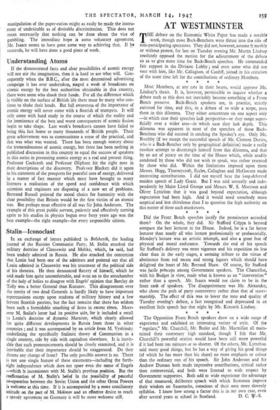Understanding Atoms
If the demonstrated facts and clear possibilities of atomic energy will not stir the imagination, then it is hard to see what will. Con- sequently when the B.B.C., after the most determined advertising campaign it has ever undertaken, staged a week of broadcasts on atomic energy by the best authorities obtainable in this country, there were some who shook their heads. For all the difference which is visible on the surface of British life there must be many who con- tinue to shake their heads. But full awareness of the importance of atomic energy will never come with a flourish of trumpets. It will only come with hard study in the course of which the reality and the imminence of the best and worst consequences of atomic fission begin to take shape. Last week's broadcasts cannot have failed to bring this fact home to many thousands of British people. Their great achievement was to communicate a sense of the practical, and that was what was wanted. There has been enough oratory about the tremendousness of atomic energy, but there has been nothing in published discussion in this country to equal the success of speakers in this series in presenting atomic energy as a real and present thing. Professor Cockcroft and Professor Oliphant hit the right note in their descriptions of the discovery. Professor Blackett did it again in his statement of the prospects for peaceful uses of energy, delivered in a matter of fact manner which must have brought to many listeners a realisation of the speed and confidence with which scientists and engineers are disposing of a new set of problems. Bertrand Russell pointed the moral choice for humanity with the clear possibility that Britain would be the first victim of an atomic war. But perhaps most effective of all was Sir John Anderson. The example of this great public servant, patiently and effectively turning again to his studies in physics begun over forty years ago was the best example—the right example—for every responsible citizen.


































 Previous page
Previous page